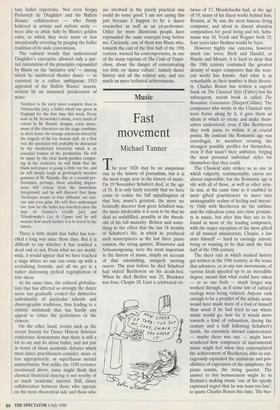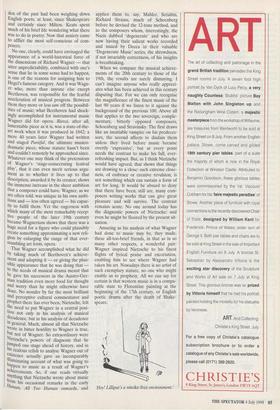Music
Fast movement
Michael Tanner
The year 1828 may be an auspicious one in the history of journalism, but it is the most tragic year in the history of music. On 19 November Schubert died, at the age of 31. It is only fairly recently that we have come to realise the full appallingness of that loss, music's greatest; the more we belatedly discover how great Schubert was, the more intolerable it is seen to be that he died so unfulfilled, possibly at the thresh- old of his full maturity. Britten said some- thing to the effect that the last 18 months of Schubert's life, in which he produced such masterpieces as the last three piano sonatas, the string quintet, Winterreise and Schwanengesang, were the most important in the history of music, simply on account of that astonishing, uniquely moving oeuvre. The year before he died Schubert had visited Beethoven on his death-bed. When he died Berlioz was 25, Bruckner was four, Chopin 18, Liszt a celebrated vir- tuoso of 17, Mendelssohn had, at the age of 19, many of his finest works behind him, Rossini, at 36, was the most famous living composer, and about to almost abandon composition for good living and wit, Schu- mann was 18, Verdi and Wagner both 15; four years later Brahms would be born.
However highly one esteems, however much one loves, Bach and Handel, or Haydn and Mozart, it is hard to deny that the 19th century contained the greatest density of major composers that the west- ern world has known. And what is as remarkable as their number is their diversi- ty. Charles Rosen has written a superb book on The Classical Style (Faber) but his subsequent, recent book is called The Romantic Generation (HarperCollins). The composers who wrote in the Classical style were borne along by it, it gave them an idiom in which to create and make them- selves understood, even if like Beethoven they took pains to violate it at crucial points. By contrast the Romantic age was centrifugal, its members creating the strongest possible profiles for themselves, even if that wasn't their ambition, forging the most personal individual styles for themselves that they could.
The Classical style strikes us as one in which vulgarity, sentimentality, excess are almost impossible; but the Romantic age is rife with all of those, as well as other artis- tic sins, at the same time as it enabled its most gifted practitioners to move into unimaginable realms of feeling and intensi- ty. Only with Beethoven do the sublime and the ridiculous come into close proximi- ty in music, but after him they are to be found in most of the leading composers, with the major exception of the most gifted of all musical miniaturists, Chopin, a law unto himself — hard to envisage anyone being or wanting to be that until the first half of the 19th century.
The sheer rate at which musical history got written in the 19th century, in the sense that advances, or at any rate movements, of various kinds speeded up to an incredible degree, meant that what could have taken — or so one feels — much longer was worked through, as if some law of cultural ecology were being violated. Anyone rash enough to be a prophet of the artistic scene would have made more of a fool of himself than usual if he had tried to say where music would go, how far it would move towards a kind of exhaustion, during the century and a half following Schubert's death. An extremely shrewd commentator — maybe there was one — might have wondered how composers of instrumental music might feel when they contemplated the achievement of Beethoven, who so out- rageously expanded the ambitions and pos- sibilities of expression of the symphony, the piano sonata, the string quartet. The answer to this bemusement might lie in Brahms's making music 'out of his openly expressed regret that he was born too late', to quote Charles Rosen this time. The bur- den of the past had been weighing down English poets, at least, since Shakespeare and certainly since Milton. Keats spent much of his brief life wondering what there was to do in poetry. Now that anxiety came to afflict the most self-conscious of com- posers.
No one, clearly, could have envisaged the appearance of a world-historical force of the dimensions of Richard Wagner — that utter unpredictability, combined with one's sense that he in some sense had to happen, is one of the reasons for assigning him to Hegel's famous category. And it was Wagn- er who, more than anyone else except Beethoven, was responsible for the fearful acceleration of musical progress. Between them they more or less saw off the possibil- ities of music; what Beethoven had shock- ingly accomplished for instrumental music Wagner did for opera. Rienzi, after all, lamentable piece as it is, was a state-of-the- art work when it was produced in 1842; a mere 40 years later Wagner had written and staged Parsifal, the ultimate musico- dramatic piece, whose stature hasn't been and couldn't remotely be approached since. Whatever one may think of the pretensions of Wagner's 'stage-consecrating festival Play', that it can even merit serious argu- ment as to whether it lives up to that description, awarded it by its creator, shows the immense increase in the sheer ambition that a composer could have. Wagner, as we are often told, was unique in his own ambi- tions and — less often agreed — his capac- ity to fulfil them. Yet the eagerness with which many of the most remarkably recep- tive people of the later 19th century became Wagnerians shows that there was a huge need for a figure who could plausibly create something approximating a new reli- gion by enlarging the range of that ever- stumbling art form, opera. That Wagner accomplished what he did by taking much of Beethoven's achieve- ment and adapting it — or giving the plau- sible appearance that he was doing that to the needs of musical drama meant that he gave his successors in the Austro-Ger- man tradition even more food for thought and worry than he might otherwise have done. No wonder by far the most brilliant and perceptive cultural commentator and Prophet there has ever been, Nietzsche, felt the need to put Wagner in a central posi- tion not only in his analysis of musical decadence, but in his analysis of decadence in general. Much, almost all that Nietzsche wrote in bitter hostility to Wagner is true, but not of Wagner. So extraordinary were Ni . etzsche's powers of diagnosis that he Jumped one stage ahead of history, and in his zealous relish to analyse Wagner out of existence actually gave an incomparably Illuminating account of what was going to happen to music as a result of Wagner's achievements. So, if one reads virtually anything that Nietzsche wrote about music from his occasional remarks in the early Human, All Too Human onwards, and applies them to, say, Mahler, Scriabin, Richard Strauss, much of Schoenberg before he devised the 12-tone method, and to the composers whom, interestingly, the Nazis dubbed 'degenerate' and who are now having their salient works recorded and issued by Decca in their valuable `Degenerate Music' series, the shrewdness, if not invariably correctness, of his insights is breathtaking.
When we compare the musical achieve- ments of the 20th century to those of the 19th, the results are surely dismaying. I can't imagine anyone who really appreci- ates what has been achieved in this century disputing that. For we can only recognise the magnificence of the finest music of the last 90 years if we listen to it against the background of the previous 100. Above all that applies to the two sovereign, comple- mentary, bitterly opposed composers, Schoenberg and Stravinsky. The first draws like an insatiable vampire on his predeces- sors, the second affects to disdain them unless they lived before music became overtly 'expressive', but at every point needs the contrast to make his full, ever- refreshing impact. But, as I think Nietzsche would have agreed, that shows that things are drawing to a close: such extreme close- ness, of embrace or creative revulsion, is not something which can sustain a form of art for long. It would be absurd to deny that there have been, still are, many com- posers writing works that can give great pleasure and will survive. The contrast remains acute. No one around today has the diagnostic powers of Nietzsche; and even he might be floored by the present sit- uation.
Amazing as his analysis of what Wagner had done to music may be, they made, these all-too-brief friends, in that as in so many other respects, a wonderful pair: Wagner inspired Nietzsche to his finest flights of lyrical praise and excoriation, enabling him to see where Wagner had taken his art. Nowadays there is no artist of such exemplary stature, no one who might enable us to prophesy. All we can say for certain is that western music is in a compa- rable state to Florentine painting at the beginning of the 17th century, or English poetic drama after the death of Shake- speare.
`Hey! Lilliput's a smoke-free environment.'















































































































 Previous page
Previous page